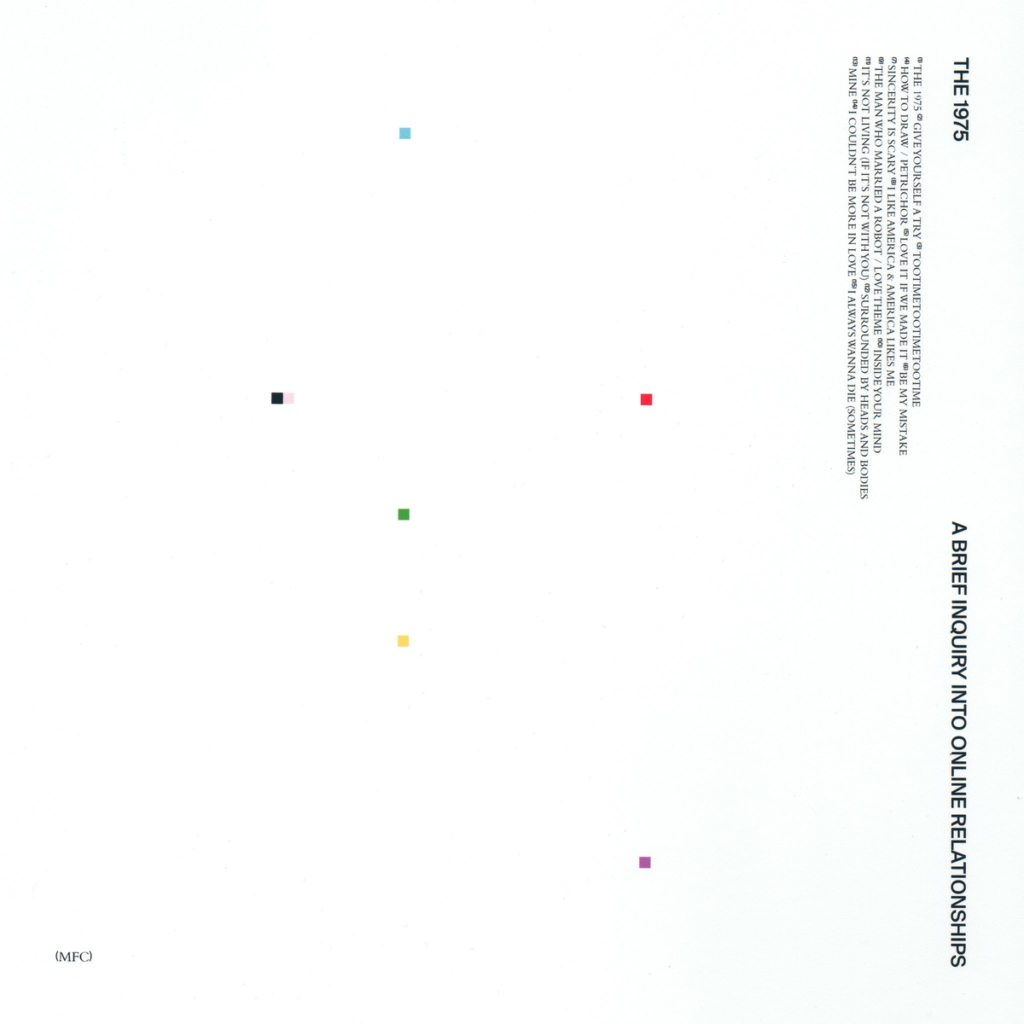A Brief Inquiry Into The 1975’s New Record
With their third studio album, The 1975’s “A Brief Inquiry Into Online Relationships”—released on Nov. 30—sings of postmodernism, addiction, romance, and of course, one’s attachment to the Internet. The record consists of 15 tracks, almost all of them self-produced by Matty Healy and George Daniel, and is a testament of the band’s new sound being the best it has ever been.
The 1975 is usually viewed as a rock band, but Healy, the lead singer and songwriter, has professed throughout the years their ongoing mission is to avoid being just another rock band. Their songs experiment with a variety of genres, including synth pop, ambient instrumental, techno jazz, and gospel.
Five singles were released this year in preparation for the new record: “Give Yourself A Try,” “Love It If We Made It,” “TOOTIMETOOTIMETOOTIME,” “Sincerity Is Scary,” and “It’s Not Living (If It’s Not With You).” The 1975’s songs are known for their complexingly daunting and pretentious lyrics juxtaposed by upbeat and fast-paced melodies you can dance to, each of these singles being great demonstrations to that stylistic and narrative choice.
“Love It If We Made It” is a dark anthem referencing current controversial topics occurring in national and global political and social spheres using direct quotes Healy heard or read. Yet the song still provides some hope for salvation amongst the turmoil, as the title is repeated throughout the chorus.
You probably wouldn’t guess that “It’s Not Living (If It’s Not With You)” is about Healy and his battle with his heroin addiction the first time you listen to its happy pop sound. Even with such a lighthearted and positive tone to it, the single “Sincerity Is Scary” speaks to the mask one wears in trying to hide their insecurities and anxieties within their interpersonal and online relationships.
In between we find hidden gems of The 1975 experimenting with different genres and unique sounds. “I Like America & America Likes Me” speaks to Healy’s strong opposition to gun violence, while intentionally using autotune and synth voice as an homage to SoundCloud rapper culture set to a funky, techno R&B backdrop. “The Man Who Married A Robot/Love Theme” starts off as a dreamy instrumental piece that turns into a spoken word—narrated by a robotic voice—of a lonely man who fell in love with the Internet.
My favorite songs off the album consist of the thoughtful piano lullabies and powerful heartbreaking ballads. “Inside Your Mind” first drew me in with its soft and slow piano intro, but Healy’s visceral description of so badly wanting to know the thoughts that runs through his partner’s head is so hauntingly beautiful that I knew immediately it was my top pick from the record.
The last two songs really solidified my love for this album. Contrary to the title, “I Couldn’t Be More In Love” is more about what happens when a relationship begins to fall apart because the love is no longer there. The song garners influence from soulful 1980s love ballads and introduces us to an intimate guitar solo and explosive key change that honestly knocked me out of the park.
“I Always Wanna Die (Sometimes),” the album’s closing song, sounds like the ending to a coming-of-age movie, which is exactly what the band intended to portray. While it does have a morbid title to it, it is a culmination of what the record stands for as a whole—the generation’s love song to the loneliness that comes with this digital age that makes us want be free from it all, but the irony is that our narcissism makes us feel this way only so often.
As a long-time fan of The 1975, I was highly anticipating the release of this record all year. This is my favorite band, and I was excited for this new “era” they were creating for themselves. For me, there are so few albums that I will not grow tired of, and after one full listen, I knew this was one of them.
“A Brief Inquiry” is the band—and more importantly, Healy—at their most honest and, well, sincere. Most of the interviews Healy attended in promoting and talking about this album involved him reiterating how he owed it to his fans to tell the truth. He wanted to tell the truth about his experiences before and after attending rehab and what it’s like to live in this age of technology and narcissism. He doesn’t try to sugarcoat or glorify anything about the topics he writes on, but he also doesn’t have an absolute viewpoint on them either. The songs are observations that lead to questions, not answers.
If you’re still hesitant as to whether or not you would like The 1975, I promise this is the album to hop on the bandwagon for.
The editor may be reached at
fdivinagracia@su-spectator.com


